After going through a year long process to deconstruct and decolonize the narrative I’ve been led to believe about my social and biological identities, I thought I was supposed to do activism a certain way.
I thought I was supposed to be expressive, boisterous, and loud with my disdain for the system that oppresses, depresses, and suppresses human due to nothing more than a function of biology.
So, I went to the marches.
I argued with people online who tried to deny my lived experience.
I participated in online call-outs whenever someone with a large platform committed an act of oppression.
Although I felt like I was doing something for the greater good, I was drained, depleted, and slightly depressed…
My nervous system and body were in a constant state of alertness which only exhausted me further.
Soon, I found myself disengaging. I just could NOT any longer. If this is what I had to put my body through to activate for change, I wanted nothing to do with it.
You may be like me – eager to fight for a better world, yet feeling tense and tired after engaging in social justice causes…
There are some of us who get overly stimulated by loud sounds, heightened energy, weather patterns, and boisterous voices. Thus, sit-ins, violence on videos, and highly charged conversations around oppression can cause you to withdraw and hide.
Worst, you tell yourself that you’re not good enough and return to the comforts of your life, preferring to put up with a culture that also oppresses you rather than harm your nervous system, cells, and bones.
Stop using your sensitivities as an excuse! Instead, embrace your sensitivities and start using it as a strength…
Being overstimulated while engaging in social justice causes may mean that you’re a person with a gentle, quiet, and highly sensititive personality. This simply means that you have to find a more sustainable way to engage in anti-oppressive work.
If you’re not familiar with the term Highly Sensitive Person (HSP), it was coined by Dr. Elaine Aron. This image by crazyheadcomics captures some of the other traits of being a HSP:
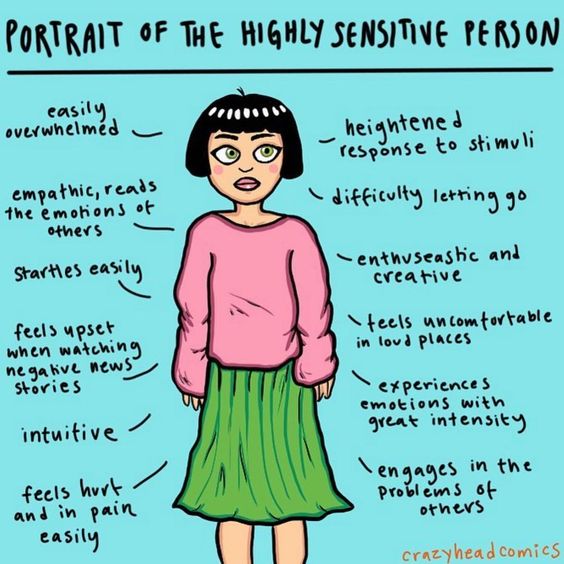
As you can see, because HSP feel deeply, care deeply, and process deeply, they can become overly stimulated, causing their body and emotions to shut down.
I also understand that those with gentle, quiet, and sensitive personalities really want to use their privilege to stand with (not for) those with marginalized identities…
You may be asking yourself:
How can I advocate for causes I believe in?
How can I stand with those who are marginalized, like me, and demand justice?
How can I release the guilt around not doing anything when everything stimulates my senses to the point of exhaustion?
How can I continue to prioritize those who are suffering due to systemic biases while making the work of exploring my unconscious biases less tiring?
In other words, how can I withdraw to regenerate without withdrawing to hide?
If you have a gentle, quiet, and highly sensitive personality, you may be…
…looking for a sustainable way to advocate for causes you believe in and stand with (not for) marginalized people without abandoning them due to your sensitivities.
Whether you’re a highly sensitive person of African descent, European descent, Pacific Islander descent, Middle Eastern descent, East Asian descent, South Asian descent, Baltic descent, Scandinavian descent, or a mix of of several ancestries, you have a strong desire to do the work of becoming anti-biased and anti-oppressive without using your quiet and gentle personality as an excuse to disengage and withdraw.
First, let me ask you this…
Are you courageous enough to have a tough conversation – with yourself? If yes:
You first need to explore why you hide your sensitive nature in the first place.
You also need to explore why you prioritize your comfort over the lives of those who hold marginalized identities.
You also need to unpack why you see some as less than human (dehumanization), or more than human (superhuman), and why you fear those who do not look like you.
You also need to explore why you have such a hard time believing that you can be a good person and also hold racist, sexist, homophobic, ableist, xenophobic, transphobic, and classist views (just to name a few).
It’s time to STOP using your sensitive nature and anxieties as an excuse and START interrupting your obedience to a culture of oppression.
You’re invited to go on an Inner Field Trip™ with me, Leesa, as your Tour Guide…
Not everyone can explore their unconscious biases the same way. Some read books and watch films to understand systemic and unconscious biases. Others attend marches and sit-ins to help them affect change. Others need to be in a room, sharing their thoughts through an invigorating conversation.
But there’s a small percentage of people who need to sit with themselves without being observed or evaluated so they can work through their hidden prejudices and stereotypes on their own and at their own pace.
You’ll know that you’re a Highly Sensitive Person who really wants to stand on the side of justice if you agree with any of these statements…
Statement #1
You’re nervous about attending an anti-racism or anti-bias workshop because you don’t want to be observed, evaluated, or examined. You’re deeply afraid of making a mistake in front of the other attendees and the facilitator/educator, thus causing more harm.
Statement #2
Intense stimuli bother you which is why you avoid marches and protests. The hot sun, loud shouts, and hungry belly leaves you feeling drained. Deep down, you feel terrible about not joining your friends on the march, but you know that you’ll be miserable for an entire month with all that stimulation.
Statement #3
Even thinking about having a tough conversation about systemic biases with your family member, friend, or co-worker is making your nervous system go into overdrive. Your stomach is feeling queasy, your heart is beating fast, your head is starting to pound.
Statement #4
Your concentration is disrupted trying to read all the anti-racism books and watch all the anti-racism movies and post all the anti-racism words on your socials and call all the influencers in on their silence; there’s so much going on at once and it’s leaving you feeling irritated.
Statement #5
You feel guilty about not watching the most recent video of a Black man or woman being violently handled by law enforcement, but your nervous system just cannot take in the brutality and cruelty. So, you struggle between not watching it to protect yourself, but feeling pressure to watch it so you can talk about it with your network.
Statement #6
Due to your empathic nature, you attract those who want to unburden themselves of their guilt and shame around racism and skin colour privilege, and you’re exhausted by the many words that people are using to make sense of social injustices. You wish people would seek your consent before unloading their racial burdens on you.
Statement #7
You care deeply. You feel deeply. You process deeply. You find that you learn best when you can go off on your own and process the richness of your thoughts.
Statement #8
You’re deeply aware that it’s a privilege to learn about racism and other systemic biases, and not have to experience it (I’ve seen this quote many times, but no one has cited the originator), and you can feel the mood of those who are suffering. You really, really want to be a better person and are stuck wondering how to do the work in a sustainable way so you’re not a driveby ally – engaged in the quest to dismantle corruption in all forms today, abandoning the quest tomorrow when your favourite retailer announces their bankruptcy sale.
If you nodded “Yes” to any of the statements above…
Going on an Inner Field Trip™ is one way to stay focused, accountable, and committed…
The Inner Field Trip™ is a 10-day virtual journey, hosted inside my community on Patreon once a quarter, where you use guided prompts developed by me through my year long process to decolonize and deconstruct my social and biological identities, along with stream of consciousness writing, a process where you write in an uncensored, unfiltered, and unedited way, so you explore your hidden prejudices and stereotypes.
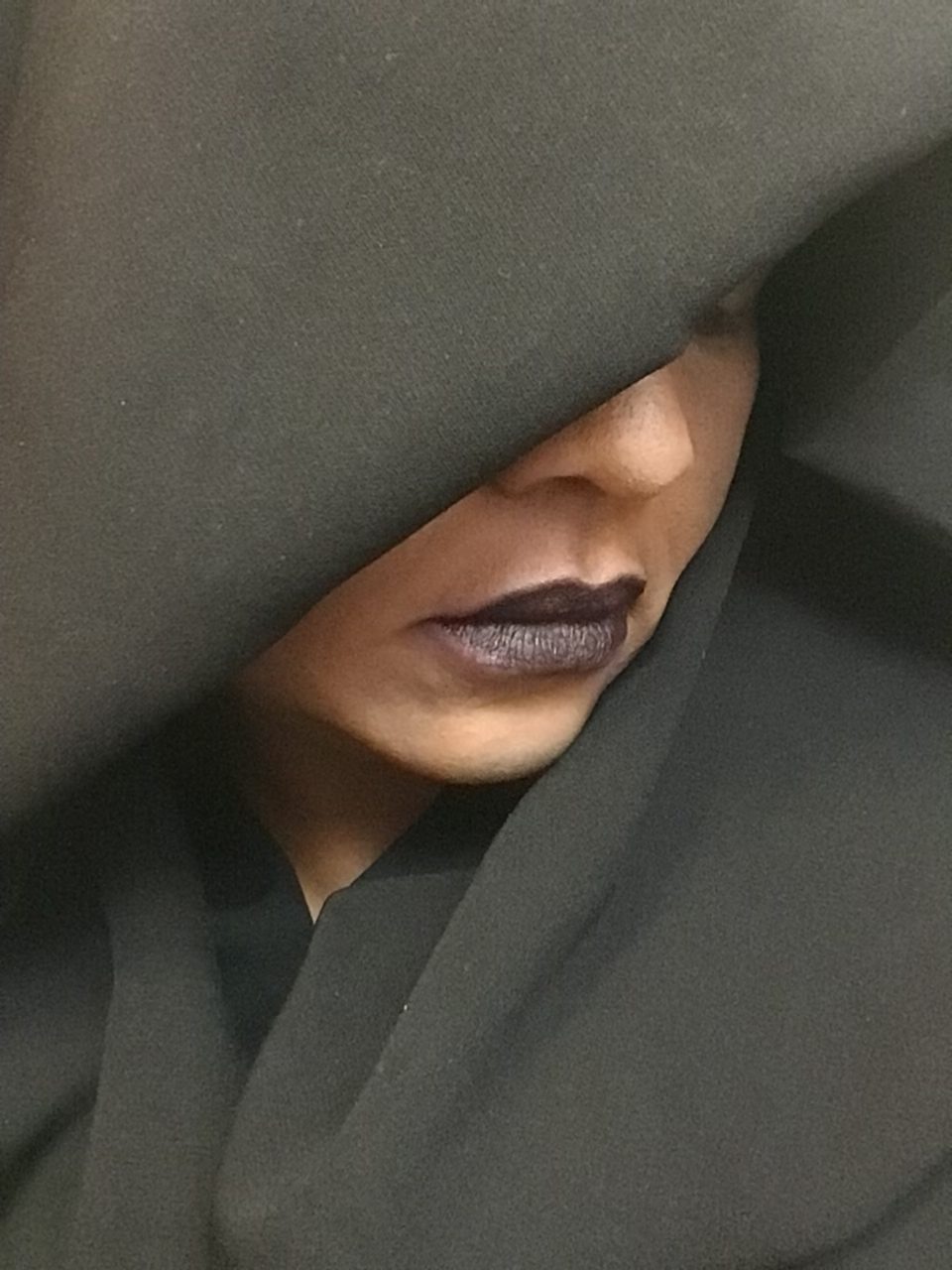 The goal of embarking on an Inner Field Trip™ is to navigate to the deep, dark crevices of your inner being to find your Inner Oppressor – that part of you that wants you to conform to the dominant culture so you stay safe, avoid rejection, and are seen.
The goal of embarking on an Inner Field Trip™ is to navigate to the deep, dark crevices of your inner being to find your Inner Oppressor – that part of you that wants you to conform to the dominant culture so you stay safe, avoid rejection, and are seen.
The opposite has happened. Instead of safety, acceptance, or acknowledgement, you feel tired, trapped, and tense. You’ve followed all the rules, dumbed down your worth, and stayed silent on social injustices. Despite submitting to the dominant culture, it has robbed you of your voice, truth, and freedom.
Meeting your Inner Oppressor is messy, unglamorous, and uncomfortable. You see the ugly, wounded, and rejected parts of yourself. As you use the guided prompts to interrogate your Inner Oppressor, you record what it says using stream of consciousness writing.
All I can do is guide you along the journey…
I do not make any promises, for example:
- I don’t promise that you’ll get the Best Ally of the Year award (no such thing exists BTW and you cannot call yourself an ally).
- I don’t promise that you’ll be cured of your racism or sexism or homophobia or other oppressive behaviour (that’s not possible anyways and anyone promising that is setting you up for failure).
- I also don’t promise that you’ll say perfect things and behave in a perfect way by going on an Inner Field Trip™ (you’ll stumble along the way and make mistakes because that’s part of growth).
Here’s what’s possible after going on an Inner Field Trip™ based on patron feedback…
I’ve started to access my rage and pain. It’s been so healing and has inspired action rather than escapism.
Amanda Boleman, patron
I have never let myself “go deep” and I’ve always considered emotional turmoil a setback (God forbid we actually feel anything …), but for the first time in my life, I am giving my emotions room to surface and breathe and take up the space they need.
Deborah Nute, patron
My reflective writings are more real, raw, honest than anything I’ve written in a long long time. Maybe ever. For once, I’m not looking for kudos or cookies or pats on the back. I’m simply doing my inner work.
Stefanie Frank, patron
One of my intentions for the next year is to try to do something every day that works to actively dismantle the white supremacy inside of me. I feel like these prompts have been absolutely huge for that.
Autumn, patron
By having a place to dump all the ideas, I can sort through them and see which ideas stick. Which ones are going to float to the top of the pile. Otherwise it’s too hard for me to filter through all my thoughts & ideas and I will end up not doing anything from overwhelm.
Karen C. Klein, patron
Frequently asked questions answered…
After you become a patron inside my exclusive community on Patreon (click here to join), you’ll see a Welcome Message with a link to the Inner Field Trip Prep Guide.
Read it to get all the info to prepare. Then, on the first day of the quest, and every weekday thereafter for 10 consecutive weekdays, you’ll get a new writing prompt, posted inside the community on Patreon. You choose a time to complete the writing prompt, then share your reaction in the comments which can only be read by me, Leesa, and other patrons. On the 10th day, we’ll get together as a group over Zoom and celebrate the end of the quest.
Yes! This isn’t a writing course; this is a self-discovery experience. So, whether you’re a great writer, or a not so great one, you’ll be writing as a means to express yourself.
I understand that if you’re an influencer, vlogger, CEO, celebrity, or someone who has influence over a large network, community, or company, discretion is your utmost concern. When you become a patron, the only person who knows is me, Leesa. No one else will see that you’ve become a patron unless you make the announcement.
My only boundary is that you’re not allowed to use my name in your social or press release until AFTER you’ve gone through the entire 10-day quest. You’ll have to show that you’ve actually done the daily exercises and it’ll have to be done according to my satisfaction before you can declare publicly that you’ve been working with me to unpack your unconscious biases.
In other words, just becoming a patron isn’t doing the work. You have to do the work to actually do the work.
$5/month may not seem like a lot to you; yet, $5/month times 100 patrons, 500 patrons, 1000 patrons, adds up. If you want to invest more, there are three other tiers to choose from ($10, $25, or $50 per month).
I chose this patron-funded model to honour my primary value – independence (click here to hear me explain it fully). I can share my wisdom in a way that doesn’t need to be filtered by editors who will sanitize my words to fit their comfort.
The patron-funded model also allows me to meet people where they are, especially since my way of exploring unconscious biases is different compared to other anti-bias educators.
The patron-funded model works for me. I ask that you put aside your definition of worth and honour what is true for me. Instead of saying, “$5/month is too little,” say, “I honour Leesa’s committment to her values with this amount.”
Ready to depart?
Click on the image below to become a patron and start the preparation to go on an Inner Field Trip™ guided by me, Leesa, and joined by hundreds and hundreds of Highly Sensitive People. You can pay-what-you-want from four pre-select amounts.
As your Tour Guide, I look forward to being your navigator as we embark on a quest to explore our unconscious biases in a sustainable, yet messy and uncomfortable way.
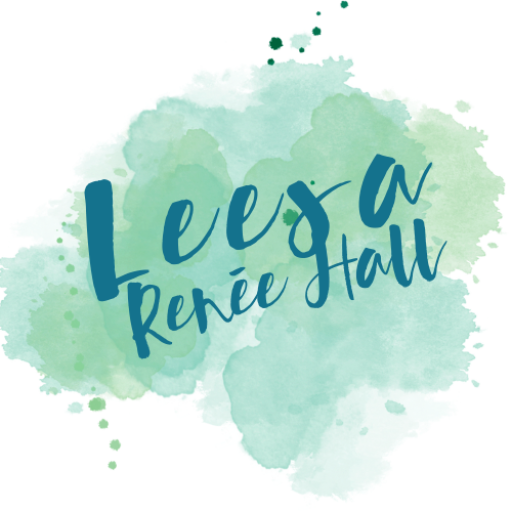
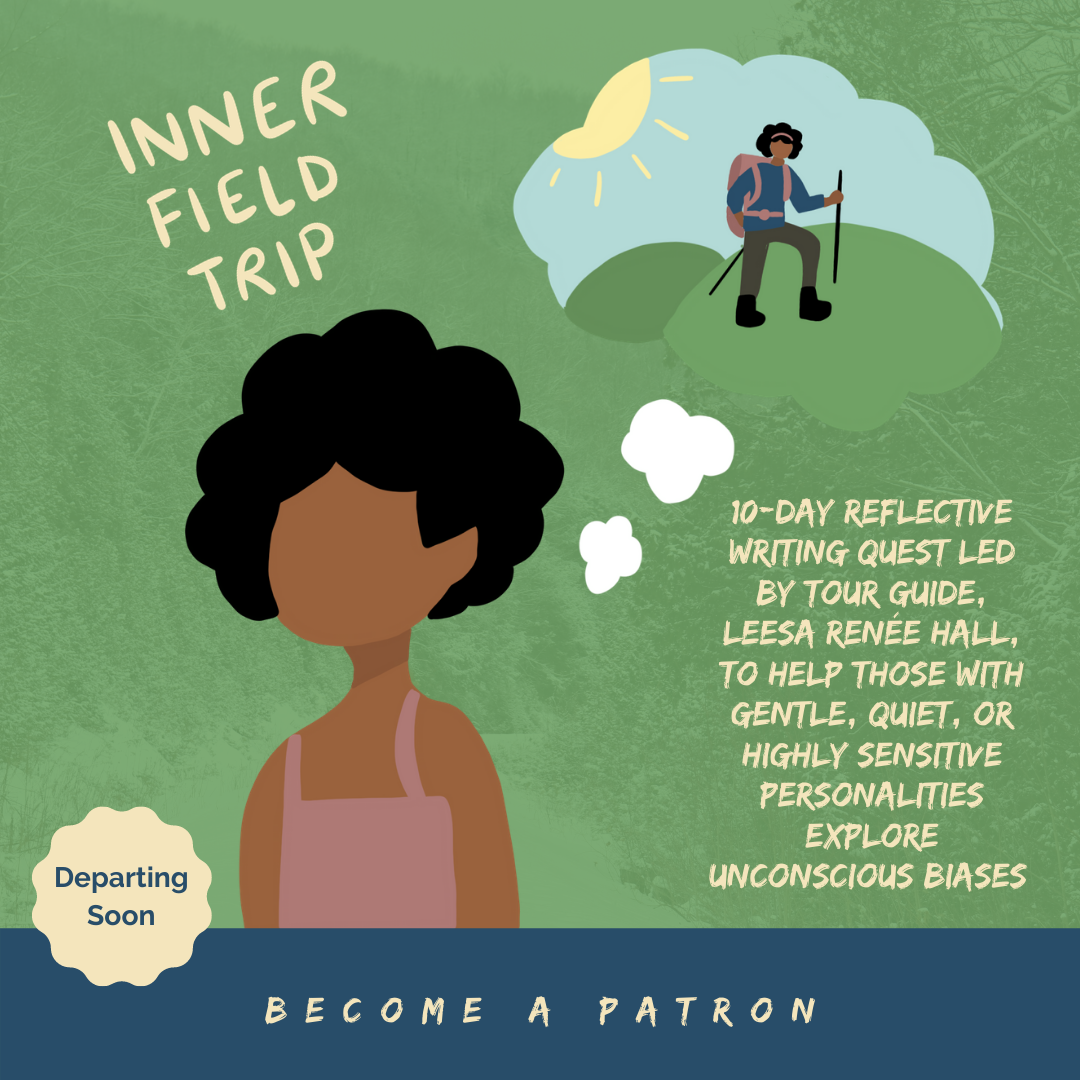

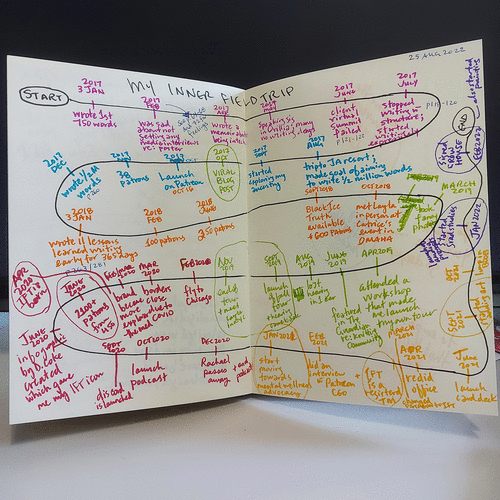
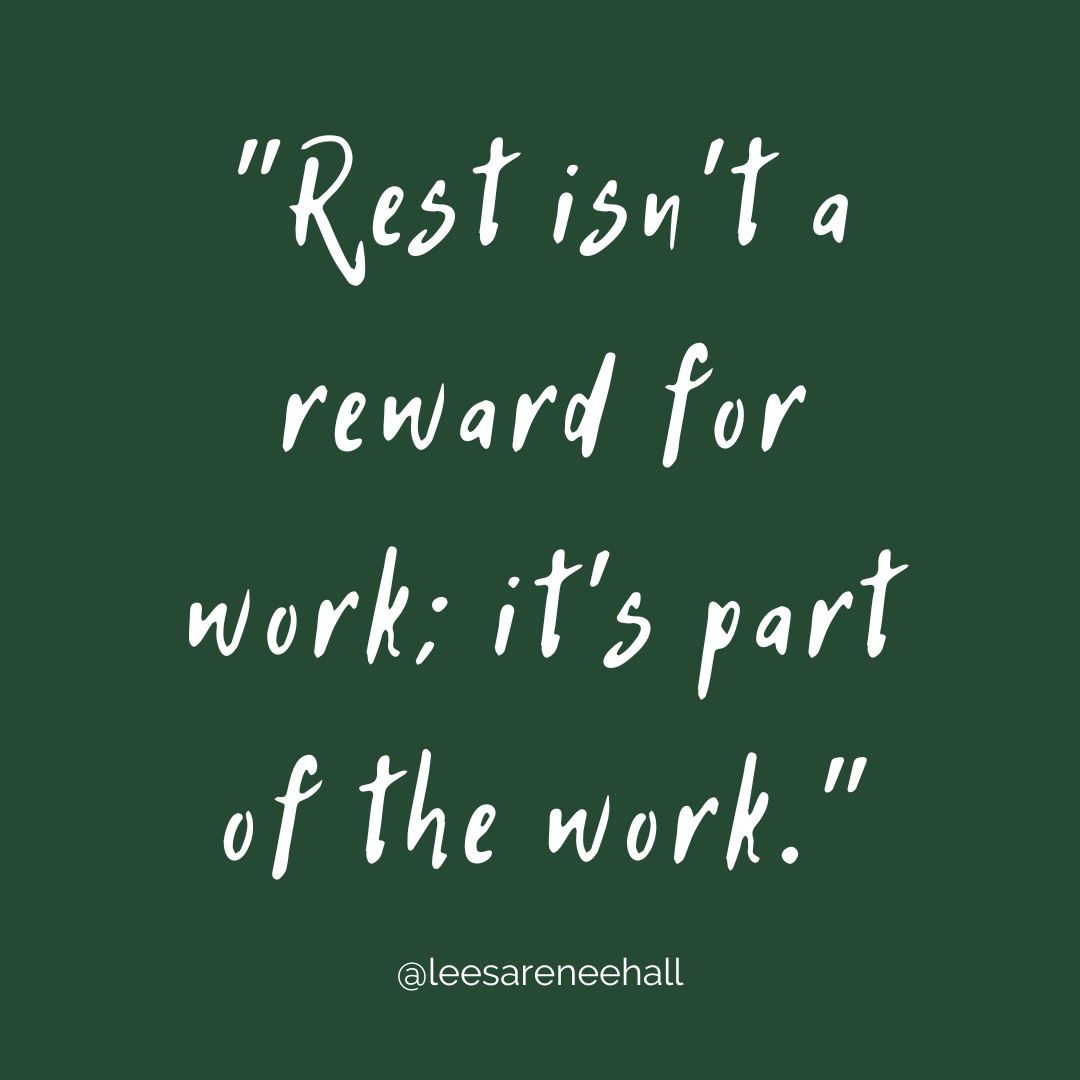
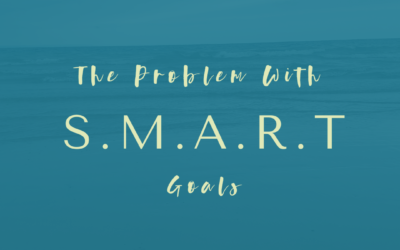
0 Comments
Trackbacks/Pingbacks